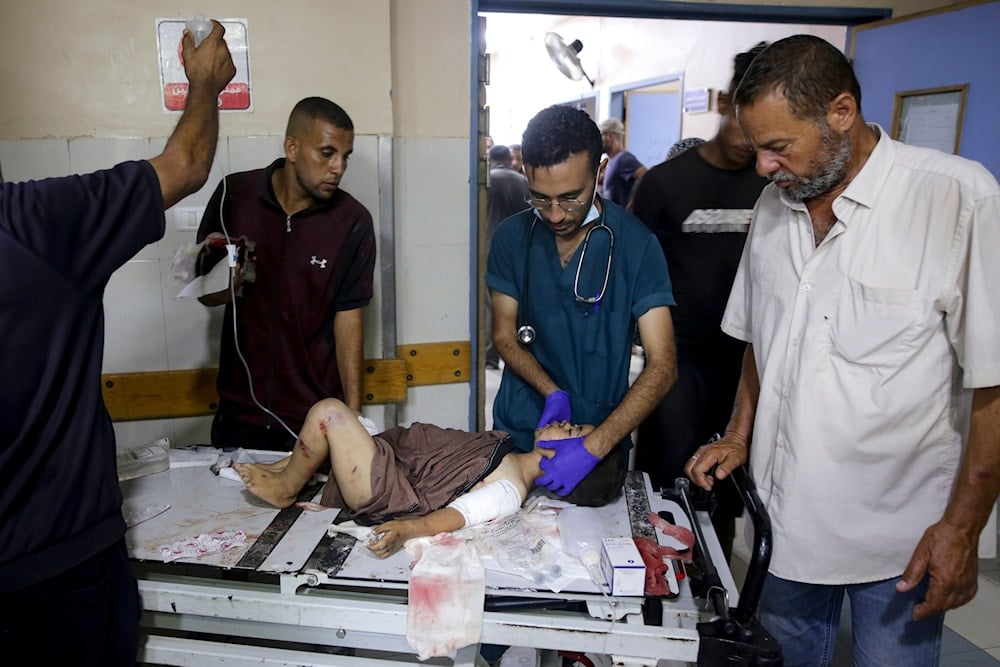'Israel' blocking physicians with Palestinian heritage from Gaza
Israeli occupation authorities ban physicians with Palestinian heritage from entering the Gaza Strip.
-

A Palestinian boy wounded in the Israeli bombardment of the Gaza Strip is treated in a hospital in Khan Younis, on July 9, 2024. (AP)
Palestinian-American doctor Jiab Suleiman arrived in Jordan last month to oversee an emergency medical mission into Gaza. An Ohio-born orthopedic surgeon, Suleiman had previously led two missions since the Israeli war on Gaza began in October and was preparing for a third. However, the day before his team was scheduled to enter Gaza, he was informed by "Israel's" coordinator of Government Activities in the Territories (COGAT) that he was denied entry.
This denial is part of a new policy affecting medical missions. According to internal memos from the World Health Organization (WHO) obtained by CNN, the policy restricts entry for US healthcare workers and others of Palestinian origin or heritage. Doctors from various medical aid organizations have reported that this policy forces them to avoid recruiting medical staff with Palestinian backgrounds, often resulting in last-minute rejections and incomplete teams entering Gaza.
“We have to actually tell people of Palestinian origin or Palestinian dual nationals that it is not possible for them to go in,” said Sameer Sah, director of programs at Medical Aid for Palestinians, an aid organization based in the United Kingdom.
“We have to distinguish between Palestinians and non-Palestinians which is not ethically right, which is not right in terms of humanitarian laws, and it is not humane.”
What is the new Israeli policy?
WHO internal memos were reviewed by CNN in early June, detailing what they describe as "Israel's" new policy. It advises aid groups against including medical professionals with a Palestinian background, even if that heritage is only through a parent or grandparent, on mission trips.
Suleiman, the medical mission lead at Rahma, a US-based humanitarian organization, referring to COGAT, said that "they said 'you're denied because of your Palestinian ID," adding that "it's very upsetting, annoying, and disturbing to deny someone entry to a war zone to do a mission just because of the fact that they're by genetics Palestinian."
Read next: US health workers sound alarm on Gaza: 'Beyond anything seen before'
“I stopped recruiting or encouraging any Palestinian physician worldwide to come help, I just can’t recruit them because I lose a slot,” Suleiman added. “Even if it’s just one doctor or one nurse, I lose a slot knowing that they’re going to be denied and I need every single body, every physician to go into Gaza.”
The policy change came after Israel launched a deadly ground offensive into Rafah in May, during which it seized control of the Rafah crossing between Egypt and Gaza. Medical aid groups that relied on the Rafah crossing for entry into Gaza have been forced instead to use Karem Abu Salem – a crossing previously used for commercial goods – to get from "Israel" into southern Gaza.
COGAT policy bans Palestinian roots
In an email sent by a WHO regional office, teams were told that the new COGAT policy stated that anyone with a Palestinian background or roots would be denied border crossing through Kerem Shalom.
“We reiterate that we STRONGLY advise against any attempt of entering Gaza with a Palestinian background/roots,” the email stated.
Read next: UK doctors retell horror accounts of genocide in Gaza: The Guardian
Another WHO email sent a few days later explained that rejections could also be simply due to ancestry, such as having “parents or grandparents who were born or formerly established in Palestine, with or even without Palestinian ID.”
“We are having HUGE problems with this, as COGAT keeps rejecting many people for this reason,” the email said.
International aid organizations are calling for "Israel" to lift the new restrictions on medical missions, emphasizing the urgent need for their teams to enter Gaza. The region's healthcare system has been severely damaged by the ongoing Israeli war on Gaza, which began in response to Hamas-led attacks on October 7.
According to the UN, over 500 healthcare workers have been killed, and 32 out of 36 hospitals have been damaged or destroyed.

 4 Min Read
4 Min Read








